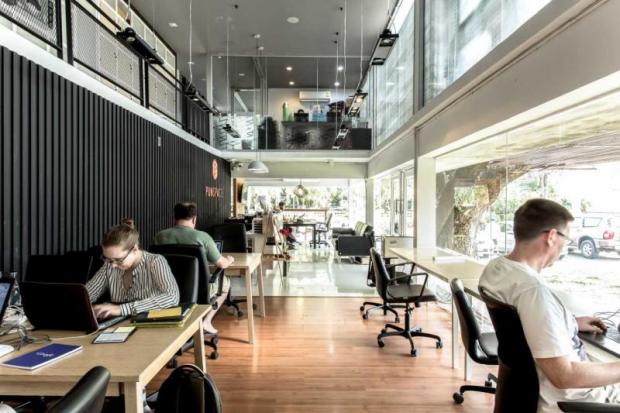
'There's no place like it in the world," says Quinn Zeda, a graphic design entrepreneur, referring to Chiang Mai's bustling "digital nomad" scene.
From November to February, between the rainy and burning seasons, Chiang Mai's Nimman neighbourhood is bustling with young, foreign freelancers, entrepreneurs and self-help gurus who can work online from anywhere in the world. And year after year, many choose to spend their winters in Chiang Mai.
Digital nomads are a classification of online workers who choose to work at coffee shops and co-working spaces around the world, instead of staying in their home countries and pretty much doing the same work.
The proliferation of accessible, fast WiFi and remote working opportunities has led many of these peripatetic millennials to Thailand for its balance of comfort, affordability and warm climate.
"I think millennials and, soon, Gen Z are facing a very challenging time; they're graduating at a time where the economy is completely changing," said Pieter Levels, the Dutch founder of the NomadList website. "The ordinary path is also not very rewarding. There's not many jobs that pay well, and career growth is stagnant, so they become freelancers, get bored at home, go travel, then go remote."
NomadList, launched in 2014, provides both a crowdsourced ranking of top digital nomad destinations and a social media platform that lets users share their locations and meet up in real life. For years, Chiang Mai held the top ranking on NomadList, but recently its was edged out by Canggu in Bali and Bangkok.
"My perfect place would be the hipsterness of Bali mixed with the mellowness of Chiang Mai in a climate like Seoul," Mr Levels said.

Vichaya and Euam Sirisanthana, the founders of Punspace.
A NOMAD MAGNET
Despite its third-place ranking, Chiang Mai retains the most concentrated and conspicuous nomad population.
"If you see a 'farang' in Nimman, they are most likely a digital nomad," said James Hunt, a digital entrepreneur and moderator of the Chiang Mai Digital Nomad Facebook Group, which has over 30,000 members. "You don't get that in many other places I've ever found. That means it's easier to find people working on similar businesses to you. The nomad life can be lonely in some places; Chiang Mai isn't one of them."
The movement itself is amorphous and loosely defined. Many people work remotely, travel and at times combine the two. But only some of those people go as far as creating a full-time lifestyle, moving from place to place, every few months or even few weeks.
Most nomads operate in a legal grey area regarding their immigration status in Thailand. Since most work remotely for companies outside of Thailand, it's not entirely clear if they are breaking any rules regarding work permit requirements. They often stay in the country on tourist visas, then go on "visa runs" outside the country and come back if they want to stay longer.
"It would be nice to have clearer rules, but it's actually very easy to be in the grey zone," said Johnny FD, a nomad who makes his money on various businesses ventures promoting and monetising the lifestyle. "If it became an official thing where every digital nomad had to apply for a business visa, people wouldn't do it. They'd go to Bali or somewhere else."

A digital nomad works after hours at the Punspace Nimman location.
ORIGIN STORY
The term was first created by two technologists, David Manners and Tsugio Makimoto, in a 1997 book called Digital Nomad. The book came out before the widespread proliferation of wireless laptops and WiFi, the two quintessential necessities of the modern digital nomad.
Mr Manners said they adapted the term from presentations on "nomadism" in the early 1990s by Jean-Pierre Liebaut, president of Mietec, Alcatel's chip-making subsidiary, describing the effect that digital mobile technologies, then in development, would have on the way people lived and worked.
The movement really took off, however, after the publication of The 4-Hour Workweek by Tim Ferriss in 2007, a book that advocated starting an online business, working from anywhere and getting enough underlings to do most of your work for you.
The end goal would be working four hours a week while relaxing on some tropical beach. Ironically, most of today's digital nomads who were inspired by the Ferriss book work a great deal more than four hours a week freelancing or starting online businesses, and many work more hours than a traditional 9-to-5 job.
Digital nomadism didn't become a full-fledged community until about eight years ago in Chiang Mai and online, where like-minded people doing similar remote work began to congregate, organising seminars, meetups and networking events. It's debatable whether or not Chiang Mai could be seen as the birthplace of the community, but the city certainly represents a flash point in its rise.
Husband and wife team Vichaya and Euam Sirisanthana founded Chiang Mai's first co-working space, Punspace, in the Nimman neighbourhood six years ago and have three locations around the city.
"My wife and I were working in Bangkok and really liked the co-working spaces there," Mr Vichaya said. "But when we moved to Chiang Mai we wanted to launch a startup but couldn't find any good working spaces, so we decided to make our own."
At first they expected local Thai entrepreneurs to be their main customers, but soon they realised that digital nomads would be their main clientele. Some 60-70% of customers using their co-working spaces would be considered digital nomads, while expats and local Thais make up the rest.
"There were nomads in Chiang Mai before we started Punspace, but once we gave them a place to meet and network it was easier for them to build a big community," Ms Euam said.
TROUBLE IN PARADISE
Chiang Mai provides a great starting point for newbie nomads, based on affordability and prevalent online associations. They flock to the city with a few thousand dollars and dreams of making it big, or at least keeping the travel-work lifestyle going as long as possible.
"My first nomad trip was from April to December 2013, with a few months in Chiang Mai at Punspace, in the very interesting early days," Mr Levels said. "There was only tens of nomads in Chiang Mai then, but now there's hundreds to thousands."
Some nomads come to Thailand without any real skills that would make them adept remote workers, like programming, graphic design or a successful blogging track record. They often lack existing clients and revenue streams.
"Lot of people that come here try to make it online, but savings run out," Ms Zeda said. "A lot of people are vulnerable to scammers selling a get-rich-quick lifestyle."
Many newcomers are particularly vulnerable to scammers that hock self-help pabulum and get-rich-quick schemes, seminars and online courses valued in the hundreds of dollars, while providing an actual value of none. Many of these scams act as pyramid schemes or multi-level marketing businesses.
Apart from financial woes and scammers, loneliness can do in many a digital nomad. Moving from place to place every few months often isolates people from friends and family. But that's also what makes Chiang Mai such a popular destination. It provides one of the few destinations for nomads where the community is easily accessible.
"When you move around so much it's hard to have legit friends and community around you," Ms Zeda said. "In Chiang Mai, it's mostly the community that keeps me coming back. It's a place that I can go that's always familiar."